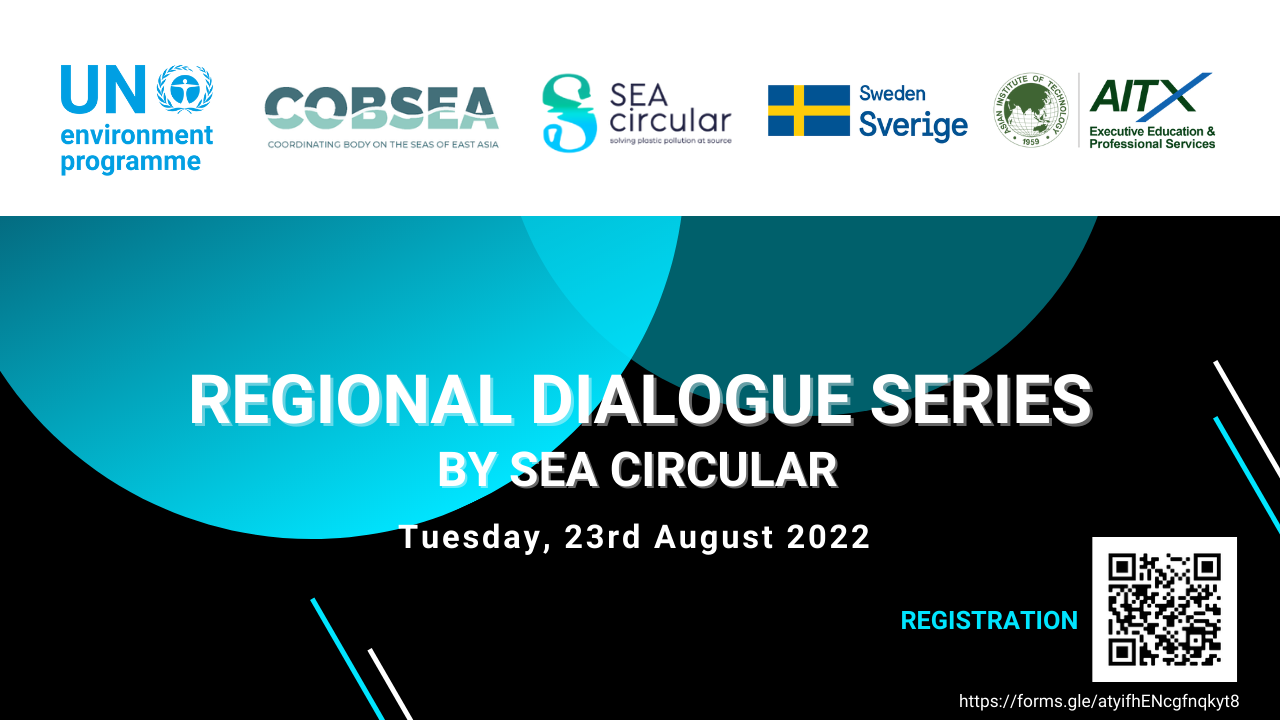
Overview:
SEA circular aims to reduce plastic pollution and its impact through a multi-sectoral approach, working with actors across the value chain – from policy makers to communities. The project strives to promote market-based solutions and enable policies to end plastic pollution at source – ensuring impact that is sustainable and scalable. One of the components of the SEA circular are series of regional dialogues. The regional dialogues are meant to act as a platform to exchange experience, enable collaboration and empower stakeholders to take actions. Each program shall combine a dialogue session and the launch of a pertinent knowledge product from the SEA circular project.
UNEP, in close collaboration with AIT Extension, Asian Institute of Technology (AIT), will organize the first regional dialogue series which compose of two sub-activities, namely (1) a Training Session on Human Rights Based Approach (HRBA) in the Plastic Value Chain and (2) a Regional Dialogue on EPR. Both events are scheduled on Tuesday, 23rd August2022.
Part I: Training on Human Rights Based Approach in the Plastic Value Chain
Tuesday, 23rd August 2022, 08:30-10:30 (GMT+7, Bangkok Time)
Context of Human-Rights Based Approach (HRBA) in the Plastic Value Chain:
The protection of our environment and ecosystems is key to human well-being and the enjoyment of human rights, including the rights to life, health and adequate standard of living, access to adequate food and to safe drinking water. A major environmental threat of growing concern in the East Asian Seas region is marine litter. The human rights implications of environmental damage are felt most acutely by disadvantaged segments of society, including rural communities and the urban poor, women, children, ethnic minorities, people with disabilities, and other marginalized groups.
Given this and UNEA 5.2’s emphasis on mainstreaming the informal sector as part of the drive to end plastic pollution, it is imperative to build appropriate awareness among key stakeholders including private sector, government agencies and civil society about HRBA in the plastic value chain
Training Objectives:
The training on HRBA has the following objectives:
Expected Takeaways:
The subject knowledge and information audiences will gain from the training are:
Topics of the Training on HRBA:
The indicative topics and subtopics of the training are as follow:
Target Audiences:
The targeted audience who will participate in the HRBA training are from 1) government agencies, 2) industries, 3) private companies, 4) business associations, 5) SMEs, 6) banks/finance institutions, 7) NGOs, 8) Start-up and 9) local enterprises.
Part II: Regional Dialogue on Extended Producer Responsibility (EPR)
Tuesday, 23rd August 2022, 10:30-12:00 (GMT+7, Bangkok Time)
Context of Regional Dialogue on EPR
At the recently concluded UNEA 5.2, countries committed to end plastic pollution and become part of an internal binding instrument which in turn will be based on a comprehensive approach to address the full life cycle of plastic – this calls for circular economy approaches and strong action from private sector in collaboration with actors at all levels.
As a comprehensive approach that looks at full lifecycle of materials, EPR has been successfully implemented to address electronic waste from industries for decades now. It offers an essential pathway to drive circularity in the plastic value chain as well and has been rolled out in several developed markets. With economic losses from plastic waste estimated to be more than USD 6 billion annually in the ASEAN market, the countries are at different levels of progress in rolling out EPR policy as a mandatory requirement. On the other hand, enabling infrastructure, awareness and capacity among private sector, ability to include their supply chain are all existing challenges that face the prospect of smooth EPR rollout.
This calls for a dialogue among policy makers, the private sector, development organizations and technical experts on the mechanics, challenges, success factors, necessary actions, practical approaches, and future trends in EPR adoption.
Objectives of the Dialogue:
The main objective of the dialogue is to facilitate a conversation on current challenges and success factors when it comes to EPR implementation as a pathway to end plastic pollution. In line with this, the dialogue shall focus on:
Expected Takeaways:
Inventory of concerns, issues, key areas for strengthening EPR adoption and points of entry to scale up EPR.
Key Questions for the Regional Dialogue on EPR:
The dialogue will start with main presentation of EPR expert/practitioner from government or non-governmental organization in ASEAN. S/he will set the context of the dialogue by sharing information on current trends, practices, and future of EPR in business environments.
3-4 Panelists will participate in the dialogue as the discussers and share comments and thoughts in order to add other important aspects for the audience broader their perspectives on the EPR subject substances. The panelists’ discussions will be guided by four key questions as follow:
Target Audiences:
The targeted audience who will participate in the regional dialogue are from 1) government agencies, 2) industries, 3) private companies, 4) business associations, 5) SMEs, 6) banks/finance institutions, 7) NGOs, 8) Start-up and 9) local enterprises, and 10) international organizations.

Please fill out all information below and you will receive an email within a 24 hour period for any further questions please fillup the form and our scheduling department and they will assist you.